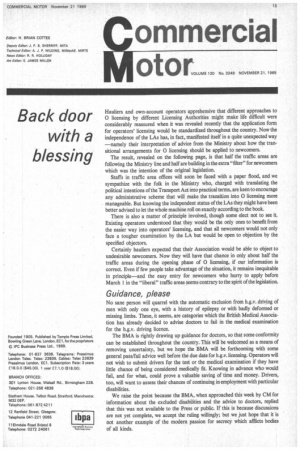Back door with a blessing
Page 15

If you've noticed an error in this article please click here to report it so we can fix it.
Hauliers and own-account operators apprehensive that different approaches to 0 licensing by different Licensing Authorities might make life difficult were considerably reassured when it was revealed recently that the application form for operators' licensing would be standardized throughout the country. Now the independence of the LAs has, in fact, manifested itself in a quite unexpected way —namely their interpretation of advice from the Ministry about how the transitional arrangements for 0 licensing should be applied to newcomers.
The result, revealed on the following page, is that half the traffic areas are following the Ministry line and half are building in the extra "filter" for newcomers which was the intention of the original legislation.
Staffs in traffic area offices will soon be faced with a paper flood, and we sympathize with the folk in the Ministry who, charged with translating the political intentions of the Transport Act into practical terms, are keen to encourage any administrative scheme that will make the transition into 0 licensing more manageable. But knowing the independent status of the LAs they might have been better advised to let the whole machine roll on exactly according to the book.
There is also a matter of. principle involved, though some elect not to see it. Existing operators understood that they would be the only ones to benefit from the easier way into operators' licensing, and that all newcomers would not only face a tougher examination by the LA but would be open to objection by the specified objectors.
Certainly hauliers expected that their Association would be able to object to undesirable newcomers. Now they will have that chance in only about half the traffic areas during the opening phase of 0 licensing, if our information is correct. Even if few people take advantage of the situation, it remains inequitable in principle—and the easy entry for newcomers who hurry to apply before March 1 in the "liberal" traffic areas seems contrary to the spirit of the legislation.
Guidance, please
No sane person will quarrel with the automatic exclusion from h.g.v. driving of men with only one eye, with a history of epilepsy or with badly deformed or missing limbs. These, it seems, are categories which the British Medical Association has already decided to advise doctors to fail in the medical examination for the h.g.v. driving licence.
The BMA is rightly drawing up guidance for doctors, so that some conformity can be established throughout the country. This will be welcomed as a means of removing uncertainty, but we hope the BMA will be forthcoming with some general pass/fail advice well before the due date for h.g.v. licensing. Operators will not wish to submit drivers for the test or the medical examination if they have little chance of being considered medically fit. Knowing in advance who would fail, and for what, could prove a valuable saving of time and money. Drivers, too, will want to assess their chances of continuing in employment with particular disabilities.
We raise the point because the BMA, when approached this week by CM for information about the excluded disabilities and the advice to doctors, replied that this was not available to the Press or public. If this is because discussions are not yet complete, we accept the ruling willingly; but we just hope that it is not another example of the modern passion for secrecy which afflicts bodies of all kinds.




































































































